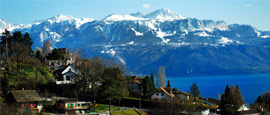Bern History
Bern was founded in 1191 when Berchtold V, Duke of Zähringen commanded a nobleman to build a city on a peninsula covered by an oak forest. The forest was cut down and the felled timber was used to build houses. The Clock Tower that stands today in the Old Town formed the city gate.
The bear featured on the present city coat of arms first appeared in 1224. According to legend, the city was named after the first animal killed by the Duke while hunting during the construction of the city.
In the 13th century, Bern expanded towards the west, and the Käfigturm (Prison Tower) formed the new main gate. In the 14th century, the third expansion phase of the city took place up to the present main railway station. In 1353 Bern became the eighth member of the Old Swiss Confederacy. The city conquered neighbouring territories and was considered to be the biggest and most powerful city state north of the Alps.
In 1405 Bern was devastated by a massive fire; the wooden buildings were consequently replaced by sandstone and by the 16th and 17th centuries most houses had already been built in the new material. This is why the original medieval Old Town has remained largely unchanged to the present day.
As Bern was not situated near any of the major trading routes, agriculture swiftly became the main source of employment for the Bernese and remained so throughout their history. Another important industry for Bern was tannery, and leather became one of their main exports.
Bernese commerce and crafts, organised in guilds, boomed in the 16th and 17th centuries, with Bernese glass paintings being in high demand across Europe.
In 1798, Bern was occupied by French troops during the French Revolutionary Wars, when it was stripped of parts of its territories. It regained the Bernese Oberland in 1802 and following the Congress of Vienna of 1814 acquired the Bernese Jura. Once again, it succeeded in becoming the largest canton of the confederacy. In 1848, Bern was made the federal capital of Switzerland.
Did you know?
• It is believed that the city was named after a bear, the first animal to be killed by its founder on a hunting expedition.
• The street signs in the Old Town have different colours. This dates back to the 18th century when Napoleon conquered the city; the colours helped mostly illiterate troops find their way to their quarters.
• Toblerone chocolate was invented in the city in 1908 and is still made exclusively in Bern.
Do you have any Feedback about this page?
© 2026 Columbus Travel Media Ltd. All rights reserved. No part of this site may be reproduced without our written permission, click here for information on Columbus Content Solutions.




 You know where
You know where